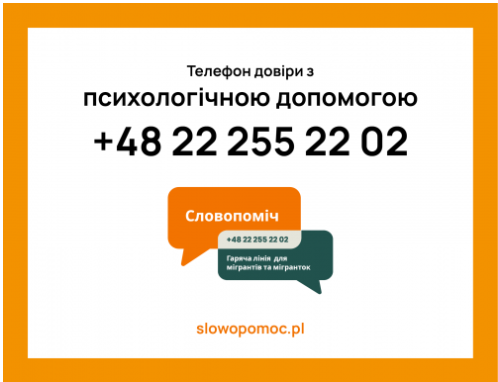What kind of psychological support do refugees need? How do their needs differ from the problems faced by Poles? Experts Anastasia Goluk, Lena Kaszycka, and Arina Shadiy discuss how the Polish Migration Forum Foundation, through the Słowopomoc initiative, helps in coping with emotional and psychological challenges.
About Słowopomoc – A Psychological Support Line for Individuals with Migration Experience
The crisis hotline launched by the Polish Migration Forum serves as an innovative platform for psychological support aimed at individuals with migration experience and their families. It offers telephone-based psychological consultations available from Monday to Friday between 12:00 PM and 6:00 PM. The languages supported by the line include Polish (Tuesday, Thursday, Friday), Ukrainian (Monday to Friday), Russian (Monday to Thursday), Spanish, and English (Friday). Assistance is directed towards all individuals with migration experience, regardless of nationality.

The project is a response to a wide range of problems and challenges, from adaptation difficulties to issues related to surviving war and concern for loved ones remaining in Ukraine. The service is confidential and anonymous, and callers can decide how much information they want to disclose. In this interview, experts from the Migration Forum describe how Słowopomoc operates, as well as its main goals and challenges.
Read also: The Psychological First Aid Kit: How to Take Care of Mental Health as a Refugee
Experts from the Polish Migration Forum on Psychological Support
Mapuj Pomoc: What level of interest does Słowopomoc attract? What kind of help do refugees from Ukrainian territories expect? Do their problems significantly differ from the problems of Poles?
Anastasia Goluk, Psychologist: I think that Słowopomoc has a somewhat specific target audience: these are individuals who, for various reasons, are not yet ready for face-to-face therapeutic contact but know that a psychologist can help and support. Perhaps they choose this form of contact partly because it is easy to disconnect at any time if something is not to their liking (although this has not yet happened during my shifts). I am pleased that more and more people are opting for telephone contact with us.
Most refugees from Ukraine need psychological support. Often, these are strong, resourceful individuals who just need to be reminded of their strengths or “superpowers.” Sometimes they need to be verbally “hugged,” and sometimes you have to delve into a complex life situation with them. Often, they need to be appreciated. Such individuals often need a psychologist to notice their efforts, their struggles, and help them view their lives from a more mature, warm, and empathetic perspective.
The problems of people with and without refugee experience are often similar. What unites them is uncertainty, the desire to make the best possible choice, and a tremendous longing for understanding: “What is going on here and what should I do about it?” Clients often seek help for their loved ones: acquaintances, family, friends – this also connects both groups.
In addition, people from Ukraine often reach out regarding typically migration-related issues and are looking for the best way to navigate their new reality. Often, this is accompanied by a variety of emotions, which they share with the psychologist.
Mapuj Pomoc: What advice would you give to people who are struggling with feelings of loneliness or loss, and for some reasons, are not opting for therapy? Is it possible to help oneself?
Lena Kaszycka, Psychologist, Social Skills Trainer, Outdoor Education Trainer: A good approach might be to seek psychological first aid. It can be provided by anyone in one’s close environment, not necessarily a professional, especially if the individual is not yet ready for professional therapy.
Psychological first aid – this term is broad and the type of help is immediate, so it’s important to make the person in need of support aware that psychotherapy is the next step to improve their well-being. The first step could be asking for help from a neighbor, a colleague, or a close friend or family member. It’s important for such a person to have regular contact with someone they trust. It would be good for them to look around in their local community and ask for a joint walk or a conversation.
Mapuj Pomoc: Initially, the Słowopomoc project was supposed to last until March 31, 2023. However, I know that you are still operating. How long do you plan to offer psychological help in Ukrainian and Russian languages?

Arina Shadiy, Head of Psychological Assistance Department: Yes. Initially, we had funding only until the end of March 2023, but fortunately, we were able to secure additional funding to continue. Currently, we have no plans to limit or change the existing mode of operation for the helpline – you can call us every day, from Monday to Sunday, between 12 PM and 6 PM. Our psychologists speak in Ukrainian, Russian, and Polish, and there are also shifts with English and Spanish languages.
As the Polish Migration Forum Foundation, we have been helping people with migration experience in Poland since 2007, and we strive to ensure that our offer is as tailored as possible to real needs. After Russia’s invasion of Ukraine, we see that our helpline has become very much needed. And although the circumstances behind the creation of the Słowopomoc project are sad, we are pleased that we are in the right place and that we can provide help to people.
Mapuj Pomoc: Dziękujemy za rozmowę!
You can read more about the Crisis Helpline on the stronie Polskie Forum Migracyjne website.
Thank you for the conversation!
As our interviewees emphasize, psychological support is not only professional therapy but also daily gestures, conversations, and attentiveness towards another human being. Regardless of our origin, we all seek understanding, support, and tools to cope with the challenges that life sets before us.
You can also find points offering psychological help in the Mapuj Pomoc database. Choose the “Psychological Support” category and the appropriate location on the map to select facilities in your area.
